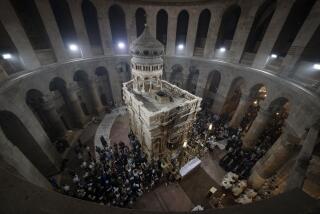Christians Are Israel’s Silent Minority
- Share via
JERUSALEM — For all the controversy surrounding the Western Wall tunnel, one remarkable detail has been almost completely obscured: The new exit opens onto the Via Dolorosa, the traditional route of Jesus’ final agony and a key pilgrimage site for Christians. Contrary to Palestinian claims, the tunnel--which has existed for millennia and isn’t even under the Temple Mount--poses no danger to Muslim religious interests. Yet by inadvertently bringing the Middle East conflict--complete with Israeli soldiers and foreign journalists and pro- and anti-government demonstrators--onto the Via Dolorosa, the tunnel exit does affect Christian interests.
In deciding to open the tunnel, Israeli officials almost certainly intended no offense to Christian sensibilities, focusing instead on the potential Muslim reaction (whose intensity they woefully underestimated). If Israel, along with the rest of the world, overlooked the obvious repercussions for Christians posed by the tunnel’s opening, it is because Israel’s churches have largely failed to maintain a credible, independent voice reflecting Christian interests in the holy city and have instead identified with one of the two warring sides of the Arab-Israeli conflict.
The Christian positions most often heard here are articulated either by right-wing Evangelical Zionists, for whom Israel’s founding heralds the imminent return of Jesus, or left-wing liberation theologians, who see Israel as an oppressor state like Pharoah’s Egypt. There is little room in either perspective for nuance, for appreciating the tragically complex nature of the conflict, for compassion for the suffering of both sides which is what one would expect of Christians living as a “witnessing community” in Jerusalem. The practical repercussion for choosing sides is the loss of an independent moral voice and the inevitable dismissal by both Israelis and Palestinians of a separate Christian agenda.
The tunnel is a classic case in point of how the churches have marginalized themselves. Israeli Prime Minister Benjamin Netanyahu chose an enthusiastic rally of Evangelical Zionists as his venue to dismiss Arab demands to close the tunnel. Meanwhile, many local churches--whose constituencies are largely Palestinian--endorsed Arafat’s line that the tunnel was a violation of Muslim religious rights.
Privately, Christians here will tell you how worried they are about the threat to the Via Dolorosa’s spiritual character. But the churches haven’t managed to publicly express that anxiety partly because leading denominations have subsumed their own agenda into the Palestinian position and partly because they fear Muslim reaction if they’re seen to be claiming the Via Dolorosa as Christian territory.
Last Christmas in Bethlehem was another example of the churches’ inability to defend their most basic interests. Yasser Arafat, who had just received control of the city from Israel, turned the holiday into a celebration of Palestinian nationalism: Manger Square became the scene of nationalist demonstrations, and Palestinian spokesmen even proclaimed Jesus a Palestinian prophet. Previous occupiers of Bethlehem, including the Israelis and Jordanians, had kept a deliberately low profile during Christmas celebrations; Arafat insisted on attending midnight mass, seeking to portray himself as defender of religious pluralism. Privately, Christians seethed but they issued no public protest. Nor have they spoken up about harassment of Christians by Muslim fundamentalists in Bethlehem.
Perhaps Arafat’s worst spiritual offense occurred last January, after Yehiya Ayash, the terrorist mastermind of the fundamentalist Hamas, was killed by Israeli agents. The Palestinian Authority placed a giant banner eulogizing Ayash and hung little plastic flags with his picture across Manger Square memorializing a mass murderer in a place that for Christians represents the hope of peace.
As the future of Jerusalem becomes increasingly central to Middle East negotiations, the churches need to begin defining their own interests and perspectives. The Christians are the only major interest group in Jerusalem whose religious attachment to the city doesn’t translate into national claims. That alone justifies an independent Christian voice here, capable of moderating and perhaps mediating between conflicting claims and passions.
More to Read
Sign up for Essential California
The most important California stories and recommendations in your inbox every morning.
You may occasionally receive promotional content from the Los Angeles Times.













